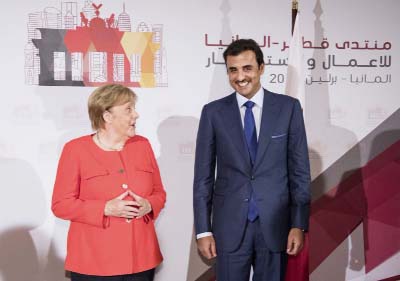
AP, Berlin :
Chancellor Angela Merkel says the dispute between Qatar and four Arab nations shows how important cooperation in the region is, and is pledging Germany’s support for constructive measures to end the crisis.
At the opening of a Qatar-Germany business forum in Berlin Friday alongside Emir Sheikh Tamim bin Hamad Al Thani, Merkel suggested the country’s diplomatic crisis with Bahrain, Egypt, Saudi Arabia, and the UAE was bad for the regional economy and security.
Merkel says “Germany is no party to the conflict but we support all constructive attempts to end the dispute.”
The four nations cut ties to Qatar last summer and also launched an economic boycott.
Al Thani thanked Merkel for her support, saying Qatar appreciates Germany’s “very ethical stance against the illegal measures imposed upon us by our neighbors.”
Concern over the policies of U.S. President Donald Trump has shot to the top of an annual ranking of Germans’ biggest fears, easily outstripping worries about refugees and terrorism, a survey showed on Thursday.
The “Fears of the Germans” survey from R+V Versicherung showed that 69 percent are worried that Trump is making the world a more dangerous place with his policies, which have included withdrawing from the Iran nuclear deal and Paris climate accord.
That compared to 63 percent who expressed fear that Germany risked being overwhelmed by refugees and 59 percent who listed terrorism as a top concern, down sharply from 71 percent last year.
“Trump’s brutal ‘America First’ stance, his hostility to international agreements and his aggressive trade and security policies, including toward allies, are frightening a majority of the population,” said Manfred Schmidt, a political scientist in Heidelberg who advises R+V on the survey.
“Trump’s attacks on Germany are having a growing impact on sentiment,” he added, referring to the president’s frequent verbal assaults on Germany’s trade surplus and relatively low levels of defense spending.
Among other concerns in the survey, 57 percent of Germans expressed fear about political extremism and 56 percent said they were worried about natural catastrophes.
The survey of roughly 2,400 Germans was conducted in June and July, before far-right protests in the eastern city of Chemnitz following the fatal stabbing of a German man, allegedly by two migrants, drew worldwide attention.
Terrorism had topped the fears ranking in the previous two years. In the five years prior to that, the top concern had been the cost of the euro crisis for German taxpayers.
The 2018 survey was released a day after an anonymous senior official in the Trump administration penned a column in the New York Times describing the president as amoral and unmoored, and detailing how members of his team are thwarting parts of his agenda in order to protect the United States.
Earlier this week, excerpts of a new book by veteran Watergate reporter Bob Woodward painted a picture of chaos in the White House and disdain among top aides over how the president is doing his job.
Chancellor Angela Merkel says the dispute between Qatar and four Arab nations shows how important cooperation in the region is, and is pledging Germany’s support for constructive measures to end the crisis.
At the opening of a Qatar-Germany business forum in Berlin Friday alongside Emir Sheikh Tamim bin Hamad Al Thani, Merkel suggested the country’s diplomatic crisis with Bahrain, Egypt, Saudi Arabia, and the UAE was bad for the regional economy and security.
Merkel says “Germany is no party to the conflict but we support all constructive attempts to end the dispute.”
The four nations cut ties to Qatar last summer and also launched an economic boycott.
Al Thani thanked Merkel for her support, saying Qatar appreciates Germany’s “very ethical stance against the illegal measures imposed upon us by our neighbors.”
Concern over the policies of U.S. President Donald Trump has shot to the top of an annual ranking of Germans’ biggest fears, easily outstripping worries about refugees and terrorism, a survey showed on Thursday.
The “Fears of the Germans” survey from R+V Versicherung showed that 69 percent are worried that Trump is making the world a more dangerous place with his policies, which have included withdrawing from the Iran nuclear deal and Paris climate accord.
That compared to 63 percent who expressed fear that Germany risked being overwhelmed by refugees and 59 percent who listed terrorism as a top concern, down sharply from 71 percent last year.
“Trump’s brutal ‘America First’ stance, his hostility to international agreements and his aggressive trade and security policies, including toward allies, are frightening a majority of the population,” said Manfred Schmidt, a political scientist in Heidelberg who advises R+V on the survey.
“Trump’s attacks on Germany are having a growing impact on sentiment,” he added, referring to the president’s frequent verbal assaults on Germany’s trade surplus and relatively low levels of defense spending.
Among other concerns in the survey, 57 percent of Germans expressed fear about political extremism and 56 percent said they were worried about natural catastrophes.
The survey of roughly 2,400 Germans was conducted in June and July, before far-right protests in the eastern city of Chemnitz following the fatal stabbing of a German man, allegedly by two migrants, drew worldwide attention.
Terrorism had topped the fears ranking in the previous two years. In the five years prior to that, the top concern had been the cost of the euro crisis for German taxpayers.
The 2018 survey was released a day after an anonymous senior official in the Trump administration penned a column in the New York Times describing the president as amoral and unmoored, and detailing how members of his team are thwarting parts of his agenda in order to protect the United States.
Earlier this week, excerpts of a new book by veteran Watergate reporter Bob Woodward painted a picture of chaos in the White House and disdain among top aides over how the president is doing his job.

